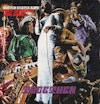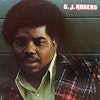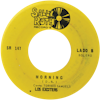When news spread of potential funding cuts to the military’s music program last August, music lovers of all ranks spoke out, waving their NPR tote bags in protest. But even the platinum-level donors were shocked to learn exactly how much tax money was going to service bands. Over a series of articles, Washington Post columnist Walter Pincus revealed that there were enough big bands, string ensembles, and bluegrass combos in the armed forces to fill a dozen or so Bonnaroos. And with an annual ticket price of five hundred million dollars, taxpayers had to wonder—where are our mixtapes?
While military recordings are not uncommon, few hold a flare to the United States Navy Port Authority Soul Band’s Together. Recorded in New York City in 1973, the now-elusive LP was used as a recruitment tool to be given away at the group’s frequent performances at inner-city schools and Black colleges. Following an all-too-real depiction of a mandatory assembly in which teachers dance in the aisles, the liner notes confess: “It is the Navy’s fond hope that music of this makes-you-wanna-move sort also will move those qualified listeners to visit their local recruiter.”
Drawing somewhat ironic comparisons to War or Blood, Sweat & Tears, the brassy arrangements and Isley guitar lines of the Port Authority Soul Band suit several covers, a few originals, and a clever combination of the two. The Thelonious prologue to Donny Hathaway’s “You Had to Know” is equal parts cadence and ballad, seemingly sight-read by the Springfield Elementary marching band. High-impact instrumentals like “D.C. Walk” and Eumir Deodato’s “Super Strut” are more Tough Guys than Top Gun, and nowhere near the Village People’s seasick disco anthem of 1979, “In the Navy.”
“We were informed by [the Bureau of Navy Personnel] that NO NAVY BAND WILL PLAY THAT SONG!” recalls Port Authority Soul Band saxophonist Mike Beegle in a recent email. “They said, believe it or not, that there was reason to believe that some or all of the members of the Village People might be homosexuals!”
Rather than enacting budget cuts, perhaps a battle of the bands is in order. Once we’ve culled our nation’s finest, we can engage in musical combat with opposing countries; drop bombs instead of dropping bombs. Our music is our nation’s greatest resource, and it should be used for global good and understanding. Saxophonist/ex-president Bill Clinton is a famous adherent to the sage saying “It is easier to understand a nation by listening to its music than by learning its language”—unsurprising sentiments from the man once jokingly called our nation’s “first Black president.”


